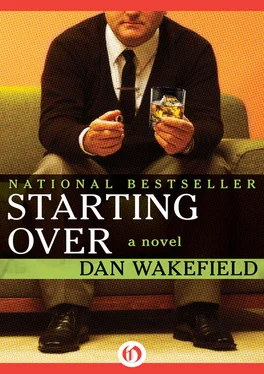“Not easily,” Potter agreed.
“I guess I hadn’t really thought about marriage. What it would really feel like.”
“Well, I’m afraid I’m not a very good person to tell about marriage,” Potter said.
“You’re divorced, you mean.”
“How did you know?”
Halligan shrugged. “Things get around. About faculty.”
“Oh. Well, anyway, my own marriage just didn’t work, but it doesn’t mean it’s not right for other people.”
“I guess you can’t tell until you do it.”
“I’m afraid not.”
They didn’t resolve anything, nor did Potter wish to influence Halligan’s decision on matrimony, but it made him feel good, that the guy would want his advice, would regard him as someone to talk things over with.
Potter felt he was getting along pretty well with the students, felt that in general they liked him, and he was surprised when Lester Harnack said he’d like to give him some advice about “student relations.” Harnack was a part-time instructor in Communications who had published a couple of poems during the Beat era, and was said to have once hitchhiked from New York City to Wilkes-Barre, Pennsylvania, with Gregory Corso. Harnack had kept pace with the changing styles of the counter culture, and now lived in a communal house in Boston’s South End, a “transitional” neighborhood.
“At least let your hair grow,” Harnack counselled Potter. “The way you dress—it creates a kind of barrier between you and the kids. I’m not just speaking of academic bullshit—I mean the girls. A lot of these girls really swing, and they’re looking for father figures. If you know what I mean.”
Potter knew. He thanked Harnack, but said he thought he’d stick to his old-fashioned style, he was pretty much set in his ways. He was well aware that his Brooks Brothers garb was a kind of uniform—just as Harnack’s Wrangler pants and boots and buckskin shirts with fringe was another kind—but it was a matter of pride with Potter to stick to the style he’d grown up with even though it was no longer in fashion, in the spirit in which one might continue to wear the colors of some once-illustrious regiment that had since gone from glory.
Besides that, Potter wasn’t interested in student seduction. Aside from disliking the cliché nature of it, the prospect of such involvements seemed messy and complicated, and Potter was trying to avoid that. He was waiting for some kind of clear-cut, mutually satisfying relationship.
But he was getting tired of waiting.
A woman friend of Potter in New York called to tell him she heard he had got a divorce and moved to Boston, and she wondered if he’d like to meet a nice available lady who was also recently divorced.
“I assume,” Potter said, “that this lady is not only divorced, but that she has two children.”
“How did you know that?” his friend asked.
“A feeling,” Potter said. “Probably telepathic.”
Potter knew because he had begun to suspect that in the great IBM machine of life, his mating card had been programmed in such a way that he was only allowed to meet a woman if she was divorced and had two children. He had nothing against divorced women with two children—some of them he had met were admirable human beings, attractive and intelligent, yet the fact that since he had started going out in his new life in Boston, except for the fragile Alison Farr, he had not met women of any other category, had begun to spook him a little.
Sometimes things go that way. There was another time in Potter’s life, back in his early New York days, when every girl he met was in her third year of analysis. Not her first year or her fourth year, but her third year. During that phase, when he met a new girl and they had had enough drinks to get into the personal shit, he would look at her appraisingly and say, “I bet you’re in your third year of analysis,” and the girl would be amazed by his insight, wonder how she had given herself away, what unconscious clues he had picked up, but Potter would only smile, mysteriously.
When you got into one of those trends there was no use going against it. Potter assured Marva he would call her friend.
He nosed his newly bought secondhand Mustang convertible down the dark, winding streets of Cambridge reeking of High Karate cologne and cursing the goddamn thoughtless residents who didn’t have numbers on their houses. It was hard enough to find the right street, there were so many little odd ones that curled around—it was almost as bad as Greenwich Village, but with fewer lights and more trees. Then when you finally got the right street you’d be lucky to find a single visible number on a house, and Potter had to get out and go up to someone’s porch, straining his eyes to make out a faded goldchipped combination of numbers; and all the time worried that someone would think he was a prowler or student revolutionary or Peeping Tom and either call the police or simply shoot him down on the front lawn. Just getting out of New York City wasn’t any guarantee of safety, not anymore. You could just as well be clobbered in a riot in Harvard Square as mugged in Central Park.
He was supposed to be looking for a green, two-story house, but it was hard to make out even the colors; in the moonless night, most everything looked grey. In the next block he found something faintly greenish, with a bright bulb lit on the porch, and figured that must be it. He cut off the motor and drew in a long, deep breath, bracing himself. He had broken another personal promise, another one of those “last things in the world he would ever do,” and that was go on a blind date. A blind date with a divorcée who had two children.
But it was better than sitting at home watching television, drinking a continuous series of Scotch and sodas, and, with an incredible exertion of will, making himself put a frozen TV Mexican dinner in the oven, repeating the incantation that If You Drink You Have To Eat. It was one of the thin threads that he felt separated him from being a real alcoholic, and he strove mightily to cling to it. But there were times when, alone with a bottle and a TV movie he had seen six times before and never liked in the first place, it seemed it might be altogether easier and less painful to stick his own head in the oven rather than a frozen TV dinner.
He got out of the car and looked up at the house. The woman and her children lived on the top of the two stories—they had the upper half of the box to themselves. He wondered what manner of lady he would find inside when he opened the door of this particular box—you could never tell from the advance descriptions. And he knew she was in the same suspension wondering no doubt what sort of character would be emerging from his own little box of a car, into her box of a house, hoping no doubt, against all the odds, he would be just the understanding fellow to want to share a box together with her, even with the two children thrown in. Or maybe she was sour on it all and wanted nothing more than a temporary diversion that would keep her own head out of the oven.
Potter sighed and shrugged: Well, he told himself, there’s nothing like romance. He had promised himself he would not be disappointed; that he would expect nothing out of the ordinary in the way of looks. She had not after all been touted as Miss Massachusetts, or even a runner-up in the Cambridge preliminaries. And yet, though he had tried to fight down his particular fantasies, her name had conjured up, in spite of his rational protestations, something exotic.
“Hello,” she said. “I’m Renée Gillespie.”
She was in fact, rather pretty; “striking” even would be an appropriate term. Good bone structure, large green eyes, a pretty mouth. Her fine black hair was pulled discreetly, stylishly back at the back of her head, with a gold clip. She wore a dark, handsomely embroidered blouse, and a long skirt. She was poised, but somewhat withdrawn, not out of coldness, Potter felt, but a sense of vulnerability. She was, in looks and manner, altogether admirable.
Читать дальше












